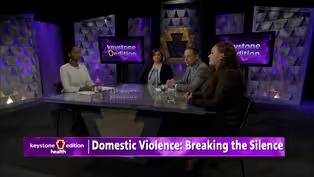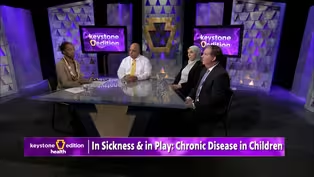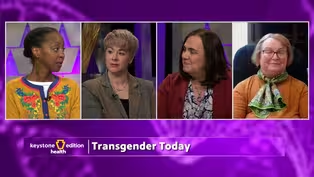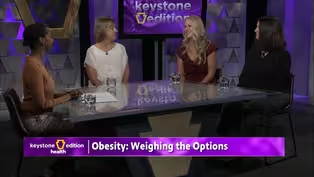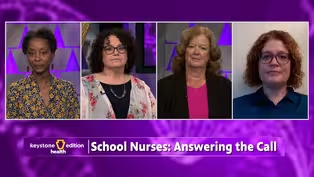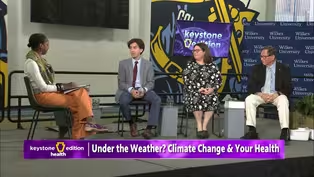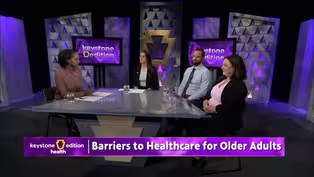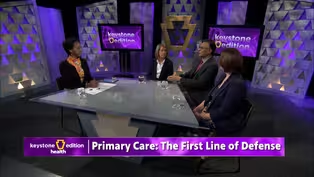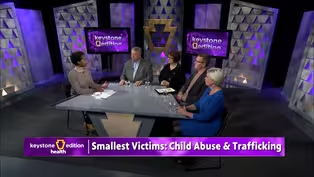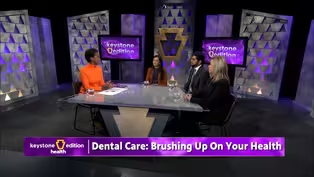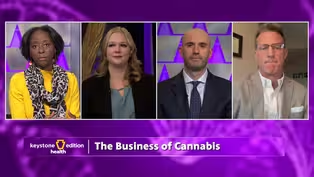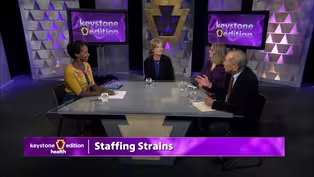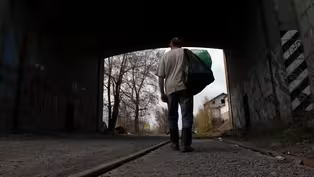Keystone Edition
Homelessness in NEPA
12/18/2023 | 26m 59sVideo has Closed Captions
Homelessness can happen to anyone at any age or socio-economic status.
Homelessness can happen to anyone at any age or socio-economic status. The rise in homelessness stems from different factors including unemployment, inflation, rising cost of food and transportation and mental health challenges. What impact does homelessness have on one's physical and mental health? What resources are available and how can someone on the brink of homelessness get help.
Problems playing video? | Closed Captioning Feedback
Problems playing video? | Closed Captioning Feedback
Keystone Edition is a local public television program presented by WVIA
Keystone Edition
Homelessness in NEPA
12/18/2023 | 26m 59sVideo has Closed Captions
Homelessness can happen to anyone at any age or socio-economic status. The rise in homelessness stems from different factors including unemployment, inflation, rising cost of food and transportation and mental health challenges. What impact does homelessness have on one's physical and mental health? What resources are available and how can someone on the brink of homelessness get help.
Problems playing video? | Closed Captioning Feedback
How to Watch Keystone Edition
Keystone Edition is available to stream on pbs.org and the free PBS App, available on iPhone, Apple TV, Android TV, Android smartphones, Amazon Fire TV, Amazon Fire Tablet, Roku, Samsung Smart TV, and Vizio.
Providing Support for PBS.org
Learn Moreabout PBS online sponsorshipMore from This Collection
Healthcare is constantly changing as technology finds new and better ways to help people live longer, healthier lives. Host Tonyehn Verkitus will address the issues that are important to the people in our community, including the ongoing pandemic, concerns about vaccines, food deserts, childhood trauma and child abuse, mental health, environmental issues, and the rising cost of staying healthy wit
Domestic Violence: Breaking the Silence
Video has Closed Captions
Access to the right resources can make facing this challenge a little easier for families (26m 59s)
In Sickness and in Play: Chronic Disease in Children
Video has Closed Captions
About 25% of children in the US aged 2 to 8 years have a chronic health condition (27m)
Video has Closed Captions
As we raise the visibility on Transgender young adults and embrace them within our culture (26m 59s)
Video has Closed Captions
Obesity is a serious risk factor many try to avoid when developing healthy eating habits. (27m)
School Nurses: Answering the Call
Video has Closed Captions
What can our school districts do to help retain and recruit nurses for future generations? (27m)
Under the Weather? Climate Change & Your Health
Video has Closed Captions
How does climate change impact individual and public health? (54m 59s)
Barriers to Healthcare of Older Adults
Video has Closed Captions
What progress have local organizations made in addressing these challenges? (27m)
Primary Care: The First Line of Defense
Video has Closed Captions
When was the last time you saw your primary care doctor? (27m)
The Smallest Victims: Child Abuse & Trafficking
Video has Closed Captions
What are the signs to know to spot child abuse and even possible trafficking? (27m)
Dental Care: Brushing Up on Your Health
Video has Closed Captions
How can providers make dental care more affordable and accessible? (26m 59s)
Video has Closed Captions
What does the cannabis industry mean for Northeastern and Central Pennsylvania? (26m 59s)
Video has Closed Captions
Low staffing levels can lead to burnout among healthcare workers (27m)
Providing Support for PBS.org
Learn Moreabout PBS online sponsorshipLive from your public media studios W via presents, studios W via presents, Keystone Additions Health, Keystone Additions Health, a public affairs program a public affairs program that goes beyond the that goes beyond the headlines to address issues headlines to address issues in northeastern and central in northeastern and central Pennsylvania.
This is Pennsylvania.
This is Keystone Addition, health Keystone Addition, health and now moderator Tanya and now moderator Tanya Verkitus.
Good evening, and Verkitus.
Good evening, and welcome to Keystone.
In welcome to Keystone.
In addition, health.
I'm addition, health.
I'm Tonyehn Verkitus.
Thank you Tonyehn Verkitus.
Thank you for joining us tonight.
for joining us tonight.
Homelessness is a complex Homelessness is a complex issue that touches the issue that touches the lives of far too many lives of far too many people in our communities.
people in our communities.
It's a reality that It's a reality that deserves our attention.
deserves our attention.
Empathy and under standing.
Empathy and under standing.
Tonight, we embark on a Tonight, we embark on a journey to amplify the journey to amplify the voices of those often heard voices of those often heard to humanize the experiences to humanize the experiences that are often pushed to that are often pushed to the shadows.
But first, the shadows.
But first, WDIA, Sarah Scinto has more several different factors several different factors can cause a person to can cause a person to become homeless or on become homeless or on housing.
Things like rising housing.
Things like rising unemployment, inflation and unemployment, inflation and mental health issues can mental health issues can all contribute to someone all contribute to someone losing a place to call home losing a place to call home according to a 20 22 study according to a 20 22 study on youth homelessness from on youth homelessness from the Pennsylvania Department the Pennsylvania Department of Education, 34 of of Education, 34 of Pennsylvania's 67 counties Pennsylvania's 67 counties saw an increase in saw an increase in homelessness between 2019 homelessness between 2019 and 2022.
The experience of and 2022.
The experience of homelessness does not look homelessness does not look the same for everyone.
Many the same for everyone.
Many people move from shelter to people move from shelter to shelter or even friend to shelter or even friend to friend and can struggle to friend and can struggle to connect with resources for connect with resources for help as they move around.
help as they move around.
Where Keystone Ed.. Help!
Where Keystone Ed.. Help!
I'm Sarah Sento.
WVIA news joining us tonight.
We have joining us tonight.
We have Christopher, executive Christopher, executive director for the Katherine director for the Katherine McCauley's Center.
Jessica McCauley's Center.
Jessica Warlow, community services Warlow, community services director for the United director for the United Neighborhood Centers and in Neighborhood Centers and in Logan, executive director Logan, executive director for the Family Properties for the Family Properties of Monroe County.
Hi, of Monroe County.
Hi, Thanks for joining us.
I Thanks for joining us.
I just just I actually would just just I actually would like to start with you.
I like to start with you.
I think people are very think people are very familiar with USC and a lot familiar with USC and a lot of their programs, but they of their programs, but they night might not be familiar night might not be familiar with programs that they with programs that they have for Howse.
Before we have for Howse.
Before we talk about that, can you talk about that, can you just give us a little just give us a little overview about your overview about your services?
Absolutely.
And services?
Absolutely.
And thank you for having me on thank you for having me on the show.
So United the show.
So United Neighborhood Centers has Neighborhood Centers has been around for 100 years been around for 100 years during the 100 year.
We during the 100 year.
We really are striving to meet really are striving to meet our mission of serving our our mission of serving our communities and providing communities and providing services to help them to services to help them to become independent.
We have become independent.
We have a variety of services, a variety of services, including housing, including housing, counseling, food pantries, counseling, food pantries, child care centers, health child care centers, health program and aging, among program and aging, among many others in the many others in the department that I work with department that I work with we really serve those who we really serve those who are need immediate are need immediate attention.
Crisis and also attention.
Crisis and also basic needs, something that basic needs, something that brings brings dignity to brings brings dignity to the human person Your program focuses its Your program focuses its primarily on Monroe and Co. primarily on Monroe and Co.
Yes, yes.
we.
Our primary Yes, yes.
we.
Our primary mission is to provide mission is to provide emergency shelter to emergency shelter to homeless children and their homeless children and their families.
That said, we families.
That said, we also do a tremendous amount also do a tremendous amount of prevention work in of prevention work in providing rent utility, providing rent utility, anything we can do to keep anything we can do to keep them housed and not losing them housed and not losing their apartment because the their apartment because the costs so much more to have costs so much more to have shelter and rehouse them.
shelter and rehouse them.
Damn, just leaving them Damn, just leaving them where they are, if at all where they are, if at all possible.
Chris, that the possible.
Chris, that the Catherine McCully's Center Catherine McCully's Center has been serving folks has been serving folks since the 80s, I believe.
since the 80s, I believe.
Right.
Yeah.
So we serve Right.
Yeah.
So we serve those experiencing those experiencing homelessness in Lackawanna, homelessness in Lackawanna, in Luzerne County, We do in Luzerne County, We do that through emergency that through emergency shelter programs and then a shelter programs and then a variety of different variety of different housing programs.
We also housing programs.
We also have a food pantry and do have a food pantry and do the housing counseling the housing counseling prevention as well.
So and prevention as well.
So and I really liked what Enid I really liked what Enid said to you.
It costs more, said to you.
It costs more, I think, financial really.
I think, financial really.
And then the cost to the And then the cost to the person itself, too, is person itself, too, is almost unmeasurable.
Yeah.
almost unmeasurable.
Yeah.
When I spoke with each of When I spoke with each of you, one of the things that you, one of the things that came up quite a bit was came up quite a bit was prevention.
And I think we prevention.
And I think we often think of people were often think of people were on housing as being those on housing as being those folks that are on the folks that are on the street.
But one of the street.
But one of the things we also talked about things we also talked about and came up in the intro is and came up in the intro is the fact that it looks very the fact that it looks very different for different different for different people.
And I don't think people.
And I don't think we think, well, the person we think, well, the person living with their uncle is living with their uncle is unhappy.
Can you touch on unhappy.
Can you touch on that a little bit, please?
that a little bit, please?
Jessica, Absolutely.
So, Jessica, Absolutely.
So, yes, I mean, we see yes, I mean, we see individuals coming from all individuals coming from all different situations and different situations and different environments.
different environments.
There, of course, may be There, of course, may be somebody who is living somebody who is living literally homeless on the literally homeless on the streets or in a shelter as streets or in a shelter as well as a hotel paid for by well as a hotel paid for by government funds.
or government funds.
or charitable funds as and in charitable funds as and in addition, we also see many addition, we also see many families who are living families who are living doubled up or even more doubled up or even more tripled up in smaller tripled up in smaller apartments.
So really, apartments.
So really, homelessness can touch homelessness can touch anybody and whole variety anybody and whole variety of different ways.
So tell of different ways.
So tell us a little bit about what us a little bit about what type of people are coming type of people are coming to the Catherine McColley to the Catherine McColley Center and what point they Center and what point they may be at when they're may be at when they're looking for services.
looking for services.
Absolutely.
So I think when Absolutely.
So I think when we're talking pre pandemic, we're talking pre pandemic, we saw a really large we saw a really large increase over the last few increase over the last few years.
over the number of years.
over the number of people were experiencing people were experiencing mental health issues or mental health issues or substance use disorder or substance use disorder or experiencing generational experiencing generational poverty.
to post pandemic.
poverty.
to post pandemic.
That population is That population is exacerbated.
And we're also exacerbated.
And we're also seeing an increase in the seeing an increase in the number of people who number of people who between previously would between previously would have defined as the acronym have defined as the acronym Alice.
So asset limited Alice.
So asset limited income constrained but income constrained but employed.
And the pandemic employed.
And the pandemic me that they lost their job me that they lost their job or inflation, just the cost or inflation, just the cost of everything around them of everything around them has increased.
But their has increased.
But their wages haven't.
That one wages haven't.
That one paycheck away.
People paycheck away.
People who've never had to ask for who've never had to ask for help before are coming and help before are coming and calling and saying, hey, calling and saying, hey, here's what's going on.
I here's what's going on.
I don't know how to navigate don't know how to navigate this system.
I don't know this system.
I don't know where to go to.
We talked a where to go to.
We talked a little bit about prevention little bit about prevention Can we start there maybe in Can we start there maybe in since you brought it up?
since you brought it up?
Would you like to talk Would you like to talk about some of the about some of the preventative tactics that preventative tactics that there are?
Will we when there are?
Will we when they call for shelter?
What they call for shelter?
What we're finding is most have we're finding is most have been evicted or very close been evicted or very close to being evicted.
will to being evicted.
will immediately ask, can we get immediately ask, can we get in touch with your landlord in touch with your landlord And then if we can pay this And then if we can pay this day, pay what they owe to day, pay what they owe to allow them to stay there allow them to stay there will he or she continue to will he or she continue to rent to them.
That's one of rent to them.
That's one of our prevention strategies.
our prevention strategies.
Can we get that connection Can we get that connection and keep them where they and keep them where they are?
If he's like, no, I'm are?
If he's like, no, I'm done or she we can see if done or she we can see if we can find them place we can find them place before they have to come before they have to come into shelter.
So there's into shelter.
So there's rental assistance.
If it's rental assistance.
If it's a utility, if the water a utility, if the water spent shadow off their spent shadow off their house, that's not habitable house, that's not habitable Can we get the water shut?
Can we get the water shut?
Turn back on and can you be Turn back on and can you be sustainable?
Continue to sustainable?
Continue to pay that also.
Is the way pay that also.
Is the way to prevent the homelessness to prevent the homelessness They may need food.
We have They may need food.
We have school districts calling us school districts calling us saying the students coming saying the students coming to the teachers to say we to the teachers to say we have no food in our house.
have no food in our house.
So it's, you know, So it's, you know, providing that so that the providing that so that the money is going to rent and money is going to rent and paying the bills.
That's paying the bills.
That's wonderful.
But we've got wonderful.
But we've got that bucket.
That's not that bucket.
That's not being filled.
Food.
So we being filled.
Food.
So we talked a little bit in our talked a little bit in our conversation about eviction conversation about eviction notices and kind of the notices and kind of the legalities and how legalities and how sometimes people think as sometimes people think as soon as they receive notice soon as they receive notice they have to leave.
But they have to leave.
But that's not the case.
that's not the case.
Correct.
Right.
And I think Correct.
Right.
And I think I mean, knowledge is power.
I mean, knowledge is power.
Right.
So I think a lot of Right.
So I think a lot of times and we're getting times and we're getting calls, they're saying, I'm calls, they're saying, I'm evicted.
I have to be out evicted.
I have to be out tomorrow.
When it said tomorrow.
When it said first calls to the landlord first calls to the landlord or what papers do you have or what papers do you have in your hand?
What have you in your hand?
What have you been to court yet?
What been to court yet?
What where are you in the where are you in the process?
Because there's a process?
Because there's a big difference between big difference between having 24 hours and and having 24 hours and and being homeless or having being homeless or having those 31 days to work those 31 days to work through the process.
How through the process.
How can we work with a landlord can we work with a landlord What supports can we What supports can we provide?
How can we look at provide?
How can we look at the strengths of the the strengths of the community member who's in community member who's in crisis?
and see what they crisis?
and see what they can do to prevent the cycle can do to prevent the cycle of homelessness?
And of homelessness?
And Jessica, once someone comes Jessica, once someone comes to you passed the eviction to you passed the eviction stage.
What are the next stage.
What are the next options that they have?
options that they have?
Yeah.
So if they're past Yeah.
So if they're past the eviction, stay really, the eviction, stay really, we we look at their family we we look at their family dynamic.
We look at the dynamic.
We look at the situation that they're situation that they're coming to us every single coming to us every single family and every single family and every single person has a different set person has a different set of circumstances.
that of circumstances.
that brought them to our door.
brought them to our door.
And that's something that And that's something that every housing counselor every housing counselor will take into will take into consideration.
as just consideration.
as just touch upon, you know, the touch upon, you know, the eviction.
One thing to eviction.
One thing to mention as well is that mention as well is that oftentimes landlords don't oftentimes landlords don't want to evict.
So they just want to evict.
So they just want that communicates.
want that communicates.
They would they would They would they would prefer to work with the prefer to work with the family and work with an family and work with an agency as well.
as on the agency as well.
as on the knowledge of the family knowledge of the family getting some intensive case getting some intensive case management and counseling management and counseling is really enticing.
And is really enticing.
And beneficial not only to the beneficial not only to the family, but to the landlord family, but to the landlord as well.
But yes, when as well.
But yes, when individuals do come to us individuals do come to us in homes, situations, or on in homes, situations, or on house situations, we look house situations, we look at each and every person at each and every person individually and we individually and we determine a good step with determine a good step with them rather than them rather than determining the step for determining the step for them.
We were talking you them.
We were talking you mentioned housing mentioned housing counselors, I believe you counselors, I believe you said that they are said that they are certified and trained.
Can certified and trained.
Can you tell us a little bit you tell us a little bit about their United about their United neighborhood centers, neighborhood centers, houses three certified HUD houses three certified HUD certified housing certified housing counselors.
It's an counselors.
It's an intensive certification intensive certification that they have to do that they have to do through HUD, which stands through HUD, which stands for Housing and Urban for Housing and Urban Development, and they are Development, and they are they're just very capable they're just very capable individuals who are very individuals who are very aware of both public aware of both public resources and resources resources and resources within our organization.
to within our organization.
to help look at those help look at those wraparound services.
As you wraparound services.
As you know, had mentioned, it may know, had mentioned, it may not just be that rental not just be that rental assistance.
It could be the assistance.
It could be the food.
It could be the child food.
It could be the child care.
It could be whatever care.
It could be whatever expense that they may have.
expense that they may have.
Maybe we can help to pay Maybe we can help to pay one bill to help to one bill to help to alleviate maybe if somebody alleviate maybe if somebody is doubling up with another is doubling up with another family, we can give them family, we can give them some extra food and some some extra food and some extra supports.
So we extra supports.
So we really think critically and really think critically and creatively to look at that creatively to look at that family unit and see which family unit and see which path forward they would be path forward they would be best to work with them.
And best to work with them.
And I think we have to talk a I think we have to talk a little bit about what a little bit about what a family it looks like family it looks like because most people might because most people might assume it's mother or assume it's mother or father or old.
But nowadays father or old.
But nowadays that seems to have changed that seems to have changed quite a bit.
We see quite a bit.
We see grandparents raising grandparents raising grandkids.
What types of grandkids.
What types of family are you seeing?
family are you seeing?
We're seeing everything We're seeing everything we're seeing we're seeing multigenerational families multigenerational families coming at this shelter.
The coming at this shelter.
The mom, the grandmother, my mom, the grandmother, my child, We've seen majority child, We've seen majority single moms.
We have single single moms.
We have single dads.
We had probably 12 dads.
We had probably 12 this past year.
which is a this past year.
which is a lot for us.
Normally, we lot for us.
Normally, we just have single moms or just have single moms or moms than their moms.
It's moms than their moms.
It's all kinds of kind of sweet.
all kinds of kind of sweet.
Don't discriminate.
We Don't discriminate.
We accept it.
as they come accept it.
as they come into shelter.
That's how we into shelter.
That's how we identify them as a family.
identify them as a family.
So and out of curiosity, So and out of curiosity, for each of you, if you for each of you, if you could touch on its is there could touch on its is there a survey or application a survey or application process for folks to come process for folks to come to the shelter?
So it to the shelter?
So it depends on where you're depends on where you're going or what count where going or what count where geographically you're geographically you're located.
Usually it's located.
Usually it's called the coordinated called the coordinated assessment.
The first thing assessment.
The first thing to do is call, call, call.
to do is call, call, call.
Whatever agency is doing Whatever agency is doing housing and say, hey, I'm housing and say, hey, I'm in need of shelter.
How can in need of shelter.
How can I go through the process?
I go through the process?
They'll probably ask you They'll probably ask you questions.
You won't even questions.
You won't even know that you're doing know that you're doing necessarily the formal necessarily the formal survey.
It's just who are survey.
It's just who are you?
What's your situation?
you?
What's your situation?
And how can as Jessica had And how can as Jessica had said before, how can we said before, how can we creatively problem solve to creatively problem solve to give you all the resources give you all the resources that you're entitled to or that you're entitled to or maybe eligible for?
I think maybe eligible for?
I think one of the other things to one of the other things to add, and Christine and I add, and Christine and I are both in Lackawanna are both in Lackawanna County, so we share a County, so we share a system.
So the beauty of system.
So the beauty of that system is that we may that system is that we may be able to ready access be able to ready access some of your information.
some of your information.
And of course, we ask And of course, we ask permission to make.
That's permission to make.
That's OK.
But we have something OK.
But we have something called a no wrong door called a no wrong door approach.
So whether they approach.
So whether they go to Kathy McCauley Center go to Kathy McCauley Center United Neighborhood Centers United Neighborhood Centers or one of our other partner or one of our other partner agencies, it's still the agencies, it's still the same assessment.
And we can same assessment.
And we can see a vulnerability index see a vulnerability index determine the best way determine the best way forward.
It's helpful to forward.
It's helpful to the case managers and the the case managers and the counselors who are helping counselors who are helping that family to find that that family to find that path and that that outcome.
path and that that outcome.
That's similar to what we That's similar to what we offer as well.
But we do offer as well.
But we do encourage on the call to encourage on the call to one one, which is the state one one, which is the state hotline for those facing hotline for those facing the housing crisis.
the housing crisis.
recently in WVIA 10.
That recently in WVIA 10.
That mean that with Andre Parks, mean that with Andre Parks, an individual, well, who an individual, well, who will share with us his will share with us his story about working with story about working with United Neighborhood Centers My father died en I was My father died when I was 11 years old.
My mother 11 years old.y mother died when I was about 2 So fromhat point, on, I So fromhat point, o I raid myself in fe SI started inking and my life slled out of y life slled out of ontrol.
e to my alcol ontrol.
Duto my alcol addicon, that's h I addicon, that how I ecame homele.
Well, doingbout I'm aie in myght auty doi about I'm a die in addicti.
I don't ow how addti.
I dot know how o stop.
I n't know h tstop.
I dot know how to go fol to go f help.
A I'll tk becausfamily writt never andoned.
buding.
s Tn e day was sleeping.
ptner die, sa next to e on theench, ki That stted the flamforrink d he hat stard the fle foro me.he need doi sething at that point.
Ie.
Theo something athat point.
was homess for eit yea before I t myse together.
One day I was togethe One day I was sleeping on bench and people from church came sleepid eople from church came over, asked me, can pray for you?
And I say, yes.
And then they came back againe time they ce d got ckes.
there, told me about athe there, told me about program called United againe program called Unit Neighborhood Permanent Neighborhood Permanent Hsing Program.
in 1980.
When I came in, I was looking for a way to save my life and I got therelookinge my life and I got there from a friend that worked for them, too.
I s in a permanent housing program.
permanent housing program.
So I gned flat.
But t So I signed flat.
But the requirements as was no drug requirements was no drug and alcohol, was allowed.
and alcohol, was allowed.
So what I did hado go to So what I did had to go to rehab for 21 days to get my rehab for 21 days to get my head together and get my head together and g my body cle body clean om the marijuana and alcohol abuse marijuana and alcohol abuse Tn I came back to apply Then I came back to apply myself to United myself to United Neighborhood.
They took me Neighboood.
Ty tooke in when low income.
It in when low income.
It changed my life.
Having a permanent place to live, a rooover my head.
But for roof over my head.
But for the grace of united the grace of united eighbor, it gave me the neighbor, it gave me the ability ttake care of ability to ta care of myself.
Cy let myself go Wn I walked in the door.
When I walked ithe door.
I've got a sense of relief I've got a sense of relief hat it was help.
I didn't that it was help.
I didn't had it before because I ad it before because I wasn't ab to help myself You cannot get clean from You cannot get clean from living on the streets.
You livinon the streets.
You cannot get clean for living cannot get clean for living on.
on Somali sofa or a floor.
You have to be able to be You have to be able to be in ur residence where you in your residence where you can shout or shave, cook can shout or shave, cook mea and take care of meals and take care of yourself.
But the program, yourself.
But the program, based on a permanent living based on a permanent ling gave me the ability to take gave me the ability to take care myself on a personal care myself on a personal level.
So let's change my level.
So let's change my outlook on the way I look.
outlook on the way look.
It is possible to turn your It is possie to turn your le around.
It is possible lifaround.
It is possible to beat addiction.
But if I to beat addiction.
But if I don't put no work.
Nothing don't put no work.
Nothing changes.
Nothing anges.
changes.
Nothing change But I must put one foot But I must put one foot four of them, put some work four of them, put some work into it.
Well, I t into into it.
Well, I put into it is what I geout of it.
Jessica.
Beautiful story.
Jessica.
Beautiful story.
here about Andre.
But I here about Andre.
But I have to say that the have to say that the housing, it's actually housing, it's actually rather gorgeous.
as well.
I rather gorgeous.
as well.
I don't think that's what we don't think that's what we think of when we think of a think of when we think of a shelter.
So wh a shelter.
So with a pernent housing, how long permanent housing, how long can folks stay there?
So can folks stay there?
So really, there ino limit really, there is no limit to perfect suortive to perfect supportive housing and that's does housing and that's does design intentionally.
design intentionally.
Understanding individuals Understanding individuals may have different barriers may have different barriers So really, it's it's up to So really, it's it's up to the participants to decide the participants to decide when they're ready to when they're ready to gradually.
And we will help gradually.
And we will help them along the way.
How many apartments are there tmw many apartments are there so potent sort of housing?
so potent st of housing?
We have 16 at United We have 16 at United Neighborhood Centers and in Neighborhood Centers and in our region in Lackawanna our region in Lackawanna County, I think we have County, I think we have about seventy five about seventy five approximate and how many folks are and how many folks are sheltering.
We have a year.
sheltering.
We have a year.
We do about 90 households We do about 90 households and I say households and I say households because we do some single because we do some single as well.
Philly families.
as well.
Philly families.
And are they in combined And are they in combined living situations like living situations like a multi-family apartment multi-family apartment building in Monroe?
We have building inonroe?
We have shelter on site.
We have shelter on site.
We have four apartments.
The Restor four apartments.
The Restor in hotels.
And what about in hotels.
And what about you?
How many are you you?
How many are you sheltering, sltering?
sheltering, sheltering?
We're doing about three We're doing about three hundred a year to.
And I hundred a year to.
And I think what does it look think what does it look like is such a great like is such a great question, too, because what's really important to us is that homelessness is us is that homelessness is always ing to be a always going to be a traumatic experience.
So traumatic experience.
So what can we do as a social what can we do as a social service ancy?o make ervice agency?
to make that as least traumatic of that as least traumatic of an experience as possible, an experience as possible, too?
So in our shelters, too?
So in our shelters, ery family has their own every family has their own bedroom that they can lock bedroom that they can lock the door at night and call the door at night and call their own space.
That's their own space.
That's their own private space.
their own private space.
They have shared bathroom, They have shared bathroom, shared kitchen and shared shared kitchen and shared living areas to we try to living areas to we try to to mn to make it like an apartment, as much privacy apartment, as much privacy as they're entitled to, to as they're entitled to, to which I think makes gives which I think makes gives you that see of safety.
you that sense of safety.
You at the end of the night You at the end of the night and these programs funded and these programs funded because I would imagine it because I would imagine it takes a lot of funds to takes a lot of funds to house three hundred ninety, house three hundred ninety, some people.
It's puzzle.
some people.
It's puzzle.
So we rely on federal, So we rely on federal, state, city, county, state, city, county, private foundation private foundation donations, all of that donations, all of that together allows us to do together allows us to do all the work that we do, all the work that we do, too.
But heavily rely on too.
But heavily rely on community support as well community support as well as their government funding as their government funding for HUD.
Yes, HUD is a for HUD.
Yes, HUD is a great supporter of many of great supporter of many of the housing programs that the housing programs that we offer in our in our we offer in our in our areas and our Northeast Bay areas and our Northeast Bay Area.
and as well, one of Area.
and as well, one of the grant requirements the grant requirements would be a percentage of would be a percentage of the match to show that the match to show that you're local community does you're local community does support this grant as well support this grant as well in your organization.
And in your organization.
And what type of funding are what type of funding are retaught about each year?
retaught about each year?
So, yeah, at this current So, yeah, at this current year, for lack, one county year, for lack, one county we just submitted a grant we just submitted a grant that was three and a half that was three and a half million million dollars.
million million dollars.
Yes.
And we are very Yes.
And we are very hopeful that we're going to hopeful that we're going to be receiving that.
And you be receiving that.
And you had funded as well.
The had funded as well.
The shelter program.
And we shelter program.
And we generally get about 90000 generally get about 90000 dollars a year.
So, again, dollars a year.
So, again, I'm looking at foundations, I'm looking at foundations, private supporters, private supporters, community.
Wherever we can community.
Wherever we can find it, Now, one of the find it, Now, one of the interesting things that interesting things that came up during our came up during our conversation is that Monroe conversation is that Monroe County is the fourth County is the fourth highest for eviction, for highest for eviction, for evictions in Pennsylvania.
evictions in Pennsylvania.
Is there a reason?
I think Is there a reason?
I think it was the state really it was the state really quick increase in rent quick increase in rent prices that rentals just prices that rentals just went through the roof in went through the roof in the last three years.
A the last three years.
A nine hundred dollar, one nine hundred dollar, one bedroom apartment is now bedroom apartment is now twelve hundred two bedroom twelve hundred two bedroom apartment that used to D11 apartment that used to D11 Hunter.
It's now 15, 16, a Hunter.
It's now 15, 16, a three bedroom that used to three bedroom that used to be maybe 14.
It's now 21. be maybe 14.
It's now 21.
So people are in there not Speople are in there not making money that is making money that is covering that increase in covering that increase in rent.
And the landlord, for rent.
And the landlord, for the most part, our the most part, our frustrated one about where frustrated one about where we're selling it to R.P.M.
we're selling it to R.P.M.
be.
So is this something be.
So is this something we're seeing in Lackawanna we're seeing in Lackawanna and count as well?
This and count as well?
This increase in rent, increase in rent, Lackawanna County as well Lackawanna County as well as in the nation?
HUD is as in the nation?
HUD is well aware of it.
and well aware of it.
and actually this last year, actually this last year, every year, HUD does every year, HUD does something quarter a point something quarter a point in time count, which is on in time count, which is on one given night in January, one given night in January, one of the coldest nights one of the coldest nights every single year.
And we every single year.
And we do count survey how many do count survey how many people are on housed or how people are on housed or how many people are in a many people are in a shelter or in a program.
shelter or in a program.
And this past, your HUD And this past, your HUD across the nation has found across the nation has found that there is a 12 percent that there is a 12 percent increase of homelessness.
increase of homelessness.
And in our community, we And in our community, we actually had close to 20 actually had close to 20 percent increase from 20, percent increase from 20, 22 to twenty twenty three.
22 to twenty twenty three.
So one of the biggest So one of the biggest reasons that we're seeing reasons that we're seeing such a large increase is such a large increase is because of the lack of because of the lack of affordable housing that affordable housing that we're seeing in our we're seeing in our communities.
And can people communities.
And can people donate housing?
It sounds donate housing?
It sounds kind of crazy.
but if I had kind of crazy.
but if I had a home, could I don't need a home, could I don't need that one of your program.
that one of your program.
Absolutely.
I think that Absolutely.
I think that falls right in with falls right in with creative problem solving.
creative problem solving.
So how can how can we as So how can how can we as social service agencies social service agencies connect the community to connect the community to those who are in need?
those who are in need?
Absolute.
That's a great Absolute.
That's a great example.
And I also think example.
And I also think that folks probably don't that folks probably don't realize how serious the realize how serious the situation is.
So what can situation is.
So what can we ask the community to do we ask the community to do to support your programs to support your programs besides giving?
Unless, of besides giving?
Unless, of course, and giving course, and giving donations?
You're welcome donations?
You're welcome to.
But I think the biggest to.
But I think the biggest part is to encourage people part is to encourage people to reach out for help and to reach out for help and to reach out early to as to reach out early to as well.
I know there's a lot well.
I know there's a lot of fear and asking for help of fear and asking for help especially if you're your especially if you're your family and your children family and your children are homelessness, you know, are homelessness, you know, who am I to report this to who am I to report this to and what are the and what are the repercussions going to be repercussions going to be to and that fear, of course to and that fear, of course is valid for many reasons, is valid for many reasons, too.
But I think calling too.
But I think calling and saying, oh, how could and saying, oh, how could solve this, too?
If you solve this, too?
If you know somebody who's going know somebody who's going through on their behalf, through on their behalf, too?
And I think just the too?
And I think just the more that we can support more that we can support one another as community, I one another as community, I think the more that we can.
think the more that we can.
I kind of avoid some of I kind of avoid some of these situations.
I would these situations.
I would say share the knowledge as say share the knowledge as well as if you are able to well as if you are able to donate your resources.
Of donate your resources.
Of course, Donate your time.
course, Donate your time.
Wonderful.
One of the Wonderful.
One of the things that I always like things that I always like to say is pay it forward to say is pay it forward does not necessarily mean does not necessarily mean financially pay it forward.
financially pay it forward.
It could be just having a It could be just having a kind word, giving a kind kind word, giving a kind word to somebody else, word to somebody else, holding the door open again holding the door open again and sharing that knowledge.
and sharing that knowledge.
If you see that somebody If you see that somebody struggling, maybe reading struggling, maybe reading about the different about the different programing that are area programing that are area learning from a resource learning from a resource such as this and being able such as this and being able to share some of that to share some of that information, you also information, you also mentioned that there are a mentioned that there are a number of people who work number of people who work at the Neighborhood at the Neighborhood Center's who have actually Center's who have actually been in this position been in this position themselves.
And I think themselves.
And I think that having that sort of that having that sort of communiqu patient with communiqu patient with someone who understands someone who understands where you're coming from where you're coming from has got to be really has got to be really valuable.
Can you share a valuable.
Can you share a story?
Yeah.
So, you know, story?
Yeah.
So, you know, just knowing that there's just knowing that there's those shared stories.
So those shared stories.
So really, when somebody is really, when somebody is going to come in through going to come in through our doors, we're very our doors, we're very mindful of having mindful of having compassion and the utmost compassion and the utmost customer service is our customer service is our priority.
So knowing that priority.
So knowing that somebody who's coming to us somebody who's coming to us is coming, one their most is coming, one their most vulnerable moments.
So vulnerable moments.
So really, you know, just really, you know, just taking that step and that taking that step and that leap forward is going to leap forward is going to really go a long way.
And really go a long way.
And knowing that that person knowing that that person who is on the other, the who is on the other, the desk may have a shared desk may have a shared story along with you and story along with you and could be empathetic with could be empathetic with your situation.
All right.
your situation.
All right.
A lot of times during the A lot of times during the holidays, people want to holidays, people want to volunteer called trying to volunteer called trying to volunteer at a soup kitchen volunteer at a soup kitchen during Thanksgiving.
And during Thanksgiving.
And they told me they didn't they told me they didn't need my help because need my help because everyone wants to volunteer everyone wants to volunteer them.
But is there another them.
But is there another time of year that you think time of year that you think help is most useful?
for help is most useful?
for your programs while we have your programs while we have a captive audience?
a captive audience?
Throughout the summer is a Throughout the summer is a great.
And as well as some great.
And as well as some of the maybe older high of the maybe older high school children who are not school children who are not in school, if their parents in school, if their parents or guardians want them to or guardians want them to do something productive.
do something productive.
You know, throughout the You know, throughout the summer when when they if summer when when they if they're not working, that they're not working, that would be a great time to would be a great time to volunteer.
I think volunteer.
I think specifically this week, specifically this week, we're doing a great toy we're doing a great toy giveaway for Christmas.
So giveaway for Christmas.
So if anybody's got some time, if anybody's got some time, this week would be great, this week would be great, too.
But I think too.
But I think volunteering can look so volunteering can look so many different ways to if many different ways to if you're really good at you're really good at cleaning, we'd love house cleaning, we'd love house cleaners.
If you're really cleaners.
If you're really organizing our food pantry.
organizing our food pantry.
Could use some organizing.
Could use some organizing.
There's there's definitely There's there's definitely a skill set for anybody to a skill set for anybody to be matched with two.
So if be matched with two.
So if you have a couple hours, you have a couple hours, Colin, there's a job for Colin, there's a job for you.
You just have to give you.
You just have to give a shout out to our churches a shout out to our churches because they prepare meals because they prepare meals for our families.
and for our families.
and shelter and they are it shelter and they are it comes in about three comes in about three o'clock in the afternoon o'clock in the afternoon and it's just that smells and it's just that smells that are coming.
Oh, it's that are coming.
Oh, it's just wonderful.
So if just wonderful.
So if there's any cooks in the there's any cooks in the community who have time and community who have time and loved to cook and want to loved to cook and want to share a meal, you know, you share a meal, you know, you can drop it off at our can drop it off at our place.
Main Street families place.
Main Street families would love it.
I was also would love it.
I was also going to ask you if you going to ask you if you could just talk about two could just talk about two one one a little bit.
I one one a little bit.
I don't think that most don't think that most people are familiar with people are familiar with two one one.
And they get two one one.
And they get thousands of calls and they thousands of calls and they will redirect you to will redirect you to exactly the service that exactly the service that you need.
Yes.
Yes.
It's you need.
Yes.
Yes.
It's for primarily we use it for for primarily we use it for housing.
Anyone housing.
Anyone experiencing in crisis.
I experiencing in crisis.
I know it asks a lot of know it asks a lot of questions.
So if there's questions.
So if there's other issues that a family other issues that a family individual is experiencing, individual is experiencing, they'll assess that and they'll assess that and referrals will go to those referrals will go to those agencies that provide those agencies that provide those services.
So if it's an services.
So if it's an emergency shelter, we'll emergency shelter, we'll get a referral for it often get a referral for it often times the client will call times the client will call first and then we direct first and then we direct them to two one one, them to two one one, because our funding depends because our funding depends on them being two one one.
on them being two one one.
But it is a it's it's a But it is a it's it's a nation or I think it's a nation or I think it's a nationwide service.
It's nationwide service.
It's definitely Pennsylvania definitely Pennsylvania wide.
It's just two one one wide.
It's just two one one from any phone, cell phone, from any phone, cell phone, landline.
You may have to landline.
You may have to wait to get to talk to wait to get to talk to somebody, but stay on hold somebody, but stay on hold and do a crossword or and do a crossword or something while you're something while you're waiting because it may take waiting because it may take a little bit to to get a little bit to to get somebody to do the somebody to do the assessment.
And then you assessment.
And then you could also just talk about could also just talk about the wrap around service.
the wrap around service.
Again, I think it helps for Again, I think it helps for people to understand that people to understand that it's kind one, stop it's kind one, stop shopping.
But if you don't shopping.
But if you don't realize what you're doing.
realize what you're doing.
Yeah, absolutely.
United Yeah, absolutely.
United Neighborhood Centers, we Neighborhood Centers, we have an assessment that have an assessment that helps to determine other helps to determine other ways that we can help the ways that we can help the family or that person is in family or that person is in front of us.
As I had front of us.
As I had mentioned earlier, child mentioned earlier, child care centers is a big part care centers is a big part of it, providing affordable of it, providing affordable child care in our region is child care in our region is very important to united very important to united neighborhood centers.
And neighborhood centers.
And that is a huge referral that is a huge referral that we make community that we make community health and aging health and aging departments.
If there is an departments.
If there is an age, a senior citizen who age, a senior citizen who needs some socialization, needs some socialization, we provide them with some we provide them with some of those resources and of those resources and really whatever other needs really whatever other needs food, clothing, utilities, food, clothing, utilities, really.
We get very really.
We get very creative with the funding creative with the funding that we have and we can that we have and we can help to meet those needs.
help to meet those needs.
Well, the word creative has Well, the word creative has come as and I want to thank come as and I want to thank you for joining us.
Thank you for joining us.
Thank you to all of our guests you to all of our guests for their insights.
and to for their insights.
and to all of you for joining us.
all of you for joining us.
for Keystone.
In addition, for Keystone.
In addition, health Anthony Verkitus.
health Anthony Verkitus.
Have a good evening.
Homelessness in NEPA - Preview
Preview: 12/18/2023 | 30s | Watch Monday, December 18th at 7pm on WVIA TV (30s)
Providing Support for PBS.org
Learn Moreabout PBS online sponsorship
- News and Public Affairs

Top journalists deliver compelling original analysis of the hour's headlines.

- News and Public Affairs

FRONTLINE is investigative journalism that questions, explains and changes our world.












Support for PBS provided by:
Keystone Edition is a local public television program presented by WVIA
